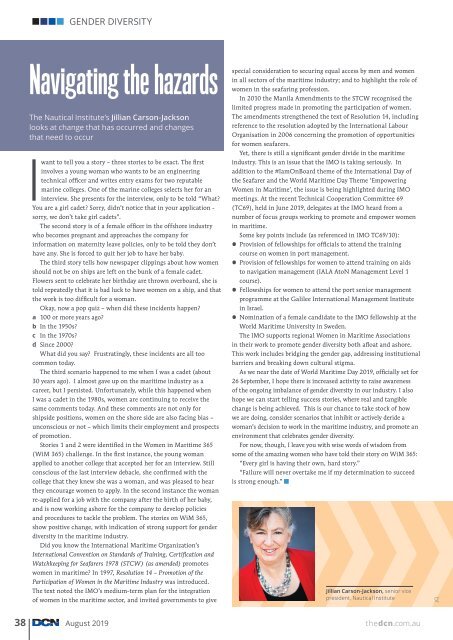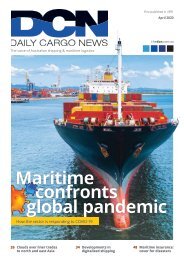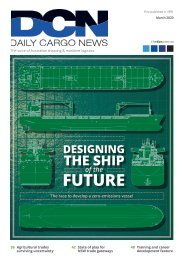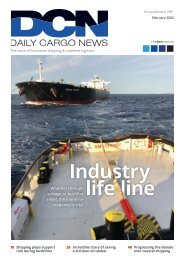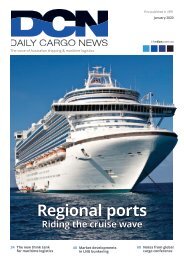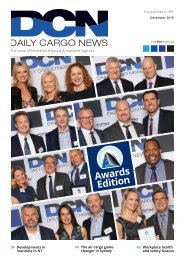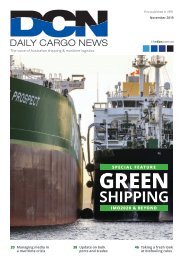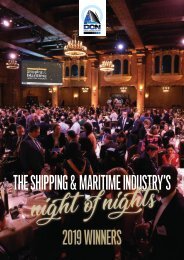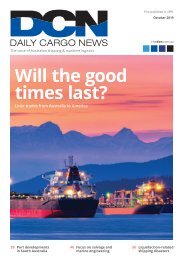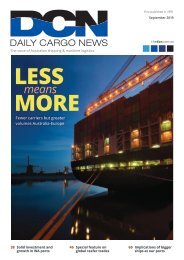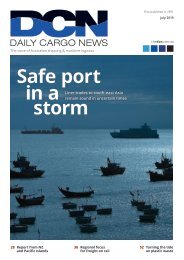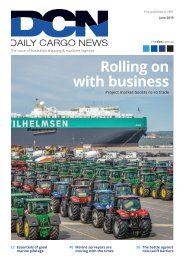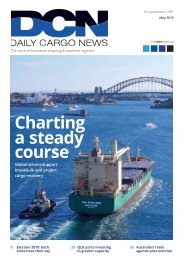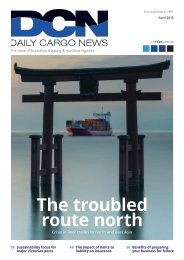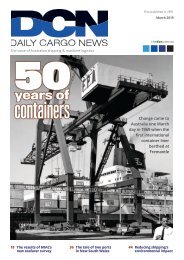DCN AUGUST Edition 2019
Create successful ePaper yourself
Turn your PDF publications into a flip-book with our unique Google optimized e-Paper software.
GENDER DIVERSITY<br />
Navigating the hazards<br />
The Nautical Institute’s Jillian Carson-Jackson<br />
looks at change that has occurred and changes<br />
that need to occur<br />
I<br />
want to tell you a story – three stories to be exact. The first<br />
involves a young woman who wants to be an engineering<br />
technical officer and writes entry exams for two reputable<br />
marine colleges. One of the marine colleges selects her for an<br />
interview. She presents for the interview, only to be told “What?<br />
You are a girl cadet? Sorry, didn’t notice that in your application -<br />
sorry, we don’t take girl cadets”.<br />
The second story is of a female officer in the offshore industry<br />
who becomes pregnant and approaches the company for<br />
information on maternity leave policies, only to be told they don’t<br />
have any. She is forced to quit her job to have her baby.<br />
The third story tells how newspaper clippings about how women<br />
should not be on ships are left on the bunk of a female cadet.<br />
Flowers sent to celebrate her birthday are thrown overboard, she is<br />
told repeatedly that it is bad luck to have women on a ship, and that<br />
the work is too difficult for a woman.<br />
Okay, now a pop quiz – when did these incidents happen?<br />
a 100 or more years ago?<br />
b In the 1950s?<br />
c In the 1970s?<br />
d Since 2000?<br />
What did you say? Frustratingly, these incidents are all too<br />
common today.<br />
The third scenario happened to me when I was a cadet (about<br />
30 years ago). I almost gave up on the maritime industry as a<br />
career, but I persisted. Unfortunately, while this happened when<br />
I was a cadet in the 1980s, women are continuing to receive the<br />
same comments today. And these comments are not only for<br />
shipside positions, women on the shore side are also facing bias –<br />
unconscious or not – which limits their employment and prospects<br />
of promotion.<br />
Stories 1 and 2 were identified in the Women in Maritime 365<br />
(WiM 365) challenge. In the first instance, the young woman<br />
applied to another college that accepted her for an interview. Still<br />
conscious of the last interview debacle, she confirmed with the<br />
college that they knew she was a woman, and was pleased to hear<br />
they encourage women to apply. In the second instance the woman<br />
re-applied for a job with the company after the birth of her baby,<br />
and is now working ashore for the company to develop policies<br />
and procedures to tackle the problem. The stories on WiM 365,<br />
show positive change, with indication of strong support for gender<br />
diversity in the maritime industry.<br />
Did you know the International Maritime Organization’s<br />
International Convention on Standards of Training, Certification and<br />
Watchkeeping for Seafarers 1978 (STCW) (as amended) promotes<br />
women in maritime? In 1997, Resolution 14 – Promotion of the<br />
Participation of Women in the Maritime Industry was introduced.<br />
The text noted the IMO’s medium-term plan for the integration<br />
of women in the maritime sector, and invited governments to give<br />
special consideration to securing equal access by men and women<br />
in all sectors of the maritime industry; and to highlight the role of<br />
women in the seafaring profession.<br />
In 2010 the Manila Amendments to the STCW recognised the<br />
limited progress made in promoting the participation of women.<br />
The amendments strengthened the text of Resolution 14, including<br />
reference to the resolution adopted by the International Labour<br />
Organisation in 2006 concerning the promotion of opportunities<br />
for women seafarers.<br />
Yet, there is still a significant gender divide in the maritime<br />
industry. This is an issue that the IMO is taking seriously. In<br />
addition to the #IamOnBoard theme of the International Day of<br />
the Seafarer and the World Maritime Day Theme ‘Empowering<br />
Women in Maritime’, the issue is being highlighted during IMO<br />
meetings. At the recent Technical Cooperation Committee 69<br />
(TC69), held in June <strong>2019</strong>, delegates at the IMO heard from a<br />
number of focus groups working to promote and empower women<br />
in maritime.<br />
Some key points include (as referenced in IMO TC69/10):<br />
• Provision of fellowships for officials to attend the training<br />
course on women in port management.<br />
• Provision of fellowships for women to attend training on aids<br />
to navigation management (IALA AtoN Management Level 1<br />
course).<br />
• Fellowships for women to attend the port senior management<br />
programme at the Galilee International Management Institute<br />
in Israel.<br />
• Nomination of a female candidate to the IMO fellowship at the<br />
World Maritime University in Sweden.<br />
The IMO supports regional Women in Maritime Associations<br />
in their work to promote gender diversity both afloat and ashore.<br />
This work includes bridging the gender gap, addressing institutional<br />
barriers and breaking down cultural stigma.<br />
As we near the date of World Maritime Day <strong>2019</strong>, officially set for<br />
26 September, I hope there is increased activity to raise awareness<br />
of the ongoing imbalance of gender diversity in our industry. I also<br />
hope we can start telling success stories, where real and tangible<br />
change is being achieved. This is our chance to take stock of how<br />
we are doing, consider scenarios that inhibit or actively deride a<br />
woman’s decision to work in the maritime industry, and promote an<br />
environment that celebrates gender diversity.<br />
For now, though, I leave you with wise words of wisdom from<br />
some of the amazing women who have told their story on WiM 365:<br />
“Every girl is having their own, hard story.”<br />
“Failure will never overtake me if my determination to succeed<br />
is strong enough.”<br />
Jillian Carson-Jackson, senior vice<br />
president, Nautical Institute<br />
JCJ<br />
38 August <strong>2019</strong><br />
thedcn.com.au


